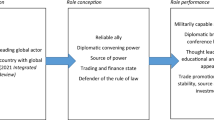Abstract
Margaret Thatcher’s death in April 2013 reawakened the political controversies around her premiership and the adulation and antipathy which she had always attracted. To many of her supporters and opponents she became a mythical figure. The ways in which this myth was constructed are analysed, and how they tend to exaggerate agency and downplay the role of contingency and the structural contexts in which Thatcher operated. Three aspects of her legacy are discussed, first her role in redirecting foreign policy and external relations, particularly with reference to the Falklands War, the revival of Atlanticism and the turn away from Europe; second her role in reversing economic decline, and how far her policies were responsible for irreversible social and economic change; and third her impact on the British party system and the conduct of British politics, particularly her role in changing both the Labour party and the Conservatives.




